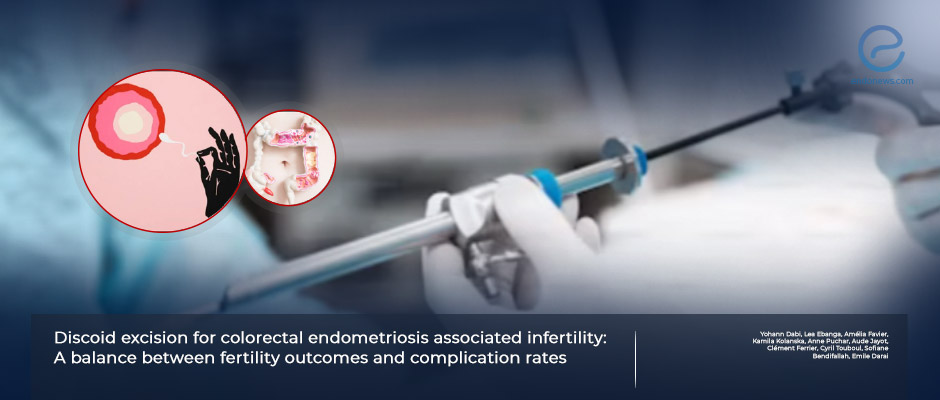Fertility outcomes after discoid excision for colorectal endometriosis.
Mar 13, 2024
High pregnancy rates were obtained after discoid resections for small colorectal endometriosis.
Key Points
Importance:
- Discoid resection for colorectal endometriosis surgery has been demonstrated as a less morbid procedure, reducing morbidity and postoperative complications.
Highlights:
- Discoid resection for small colorectal endometriosis lesions is a safe method and provides good fertility outcomes.
What's done here:
- A French research team set up a prospective study to evaluate the impact of discoid resection-only surgical approaches for colorectal endometriosis on fertility outcomes.
- The postoperative Endometriosis Fertility Index was measured for every patient. Fertility was assessed during follow-up visits using a questionnaire.
- Postoperative complications were calculated according to the Clavien-Dindo classification.
Key Results:
- Among 109 patients who were eligible to be evaluated for fertility outcomes, 49 desired to conceive following their surgery.
- 25 successfully conceived after the surgery, while 24 couldn't, despite desire.
- Among the patients who achieved pregnancy, 60% had spontaneous pregnancies, and the rest underwent ART.
- The live-birth rate among spontaneously conceived women was 75%. In the ART group, live birth rates were lower, early miscarriages were higher.
- According to the Clavien-Dindo classification, 12 patients with postoperative complications were mostly grade I and II. Only one woman was classified as Grade IIIb.
- Urinary infection and voiding dysfunction were the prominent postoperative complications.
Limitations
- The study had a structure that did not include other types of surgeries for colorectal endometriosis for comparison.
- The lack of information about the infertile patients was the weakness of the research.
Lay Summary
Colorectal endometriosis is one of the most severe forms of deep endometriosis, composing 85% of all bowel lesions. Radical treatment is segmental resection of the bowels, which can cause postoperative severe complications such as rectovaginal fistula and voiding dysfunctions that negatively affect the quality of life. Surgeons are used to perform rectal shaving and discoid resection approaches besides this radical technique. Rectal shaving is usually indicated in serosal or superficial muscular involvement of endometriosis, with a higher risk of recurrence as a complication. Conversely, discoid resection is a less morbid procedure with a similar recurrence rate as segmental resection. This type of management can also reduce the time of postoperative conception and increase pregnancy rates.
Dr. Dabi et al. from the Department of Gynecology, Obstetrics and Reproductive Medicine of Tenon Hospital, Sorbonne University, Paris, France, aimed to reveal the pregnancy outcomes after discoid surgery for colorectal endometriosis. Patients in this study included those who underwent laparoscopic discoid resection by three surgeons in their tertiary clinic. A double discoid excision was made for lesions larger than 3 cm.
Among 406 women with colorectal endometriosis operated on in five years, 113 underwent discoid resection procedures. After separating the patients according to the inclusion criteria, fertility outcomes were evaluated for 49 patients who desired to conceive. The surgical indications of those 49 patients who desired pregnancy were mainly pelvic pain. Some failed in previous IVF/ICS as well. The complication rate was observed in one-quarter of the study population.
The authors found a high spontaneous pregnancy rate of 60% after discoid resection, and they put forward that their data suggest a positive impact of surgery on fertility outcomes for small colorectal lesions. Another finding of the study is a lower early miscarriage rate in spontaneously conceived women when compared to women who had ART after the operation.
This study, the first one that focused on fertility outcomes after discoid resection, was recently published in the Journal of Gynecology Obstetrics, and Human Reproduction.
Research Source: https://pubmed.ncbi.nlm.nih.gov/38211693/
colorectal endometriosis discoid resection infertility postoperative complication pregnancy deep endometriosis.

